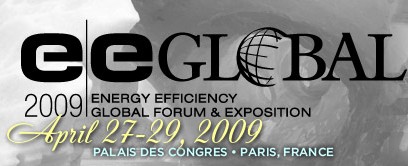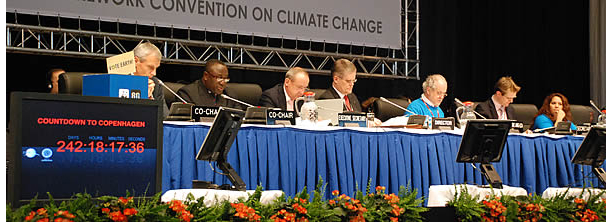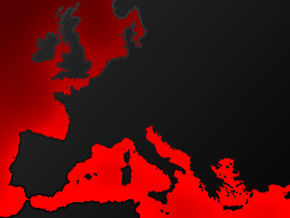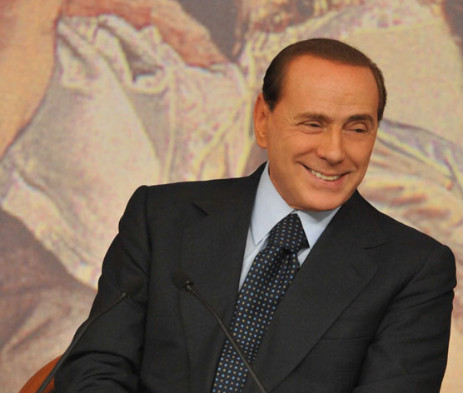European Union
-
Tidbits from the first day of the Energy Efficiency Global Forum
The problem with conferences like this is that interesting tidbits — factoids and insights — come flying at you continuously. An Official Journalist is supposed to weave these tidbits into a narrative story, but in my experiences those stories tend to be fairly boring — the only reason to read them is to pull out […]
-
Running out the climate clock
The “Countdown to Copenhagen” clock was front and center at the Bonn climate talks last month.Courtesy UNFCC I suppose what happened to the ticking clock says all we need to know about the state of the make-or-break international negotiations on combating climate change. The bright red digital timepiece was affixed to the podium for the […]
-
Myth: Europe’s experience shows that cap-and-trade can’t work
It is now widely acknowledged that Europe’s carbon trading program — the ETS — made several key mistakes in its initial trial period. The system covered a narrow slice of the EU economy, yielding a relatively small market wherein price fluctuations could not be effectively smoothed out. The data on baseline emissions was poor and […]
-
How do you solve a problem like Silvio?
G8 officials don’t want Silvio Berlusconi to play a leading role in any climate talks that may occur this summer during the July summit in Italy. (Photo Livio Anticoli, Courtesy Prime Minister of Italy’s Office) Barack Obama has a problem, one he shares with Gordon Brown. And, for that matter, with Nicolas Sarkozy, Angela Merkel, […]
-
A mandarin’s plea for climate action
New Year’s Day is not, I suppose, everyone’s idea of the best time to receive a sobering message. But like it or not, this year it happened to me. The message that popped into my inbox, unannounced and unexpected, would have brought even the most hungover dreamer smartly back to reality. “Today,” it opened uncompromisingly, […]
-
Washington new center of global warming battle
WASHINGTON — European ministers are flocking to Washington drawn by the new administration’s pledge to help lead the fight against climate change, an issue largely put on ice for eight years here. Ministers from across Europe as well as Canada are taking part in a whirl of meetings here this week to gauge prospects of […]
-
E.U. confident Obama will follow its lead on climate change
BRUSSELS — The E.U. presidency is confident that the United States under President Barack Obama “will follow the leadership of the European Union”, by setting ambitious mid-term goals for cutting greenhouse gases. The 27 E.U. nations in December committed to reducing greenhouse gas emissions by 20 percent by 2020 but have also agreed to increase […]
-
European climate program reduces emissions
A few years back, Europe's cap-and-trade system, called the ETS, was taking a beating in the press. Some of the criticism was legit: the program really did make some silly missteps in the early years.
The biggest bungles were tied up with how the ETS handed out emissions permits. First, they decided to give them out for free -- which, as Sightline has discussed ad nauseum, was a recipe for windfall profits for the firms that got free permits. And second, for lack of reliable emissions data, the ETS handed out more permits than firms actually needed. Ultimately, the glut of permits led to a collapse in the price of carbon, and very little progress in reducing emissions.
But the good thing about making a mistake is that you can learn from it. And that's just what the ETS has done. To fix the windfall problem, nations participating in the ETS have begun auctioning off permits rather than handing them out for free. And now, there's evidence that the ETS has really begun to reduce emissions. The New York Times reports:
In a boost for the system ... a prominent research company, New Carbon Finance, said its calculations showed that the largest cause of a reduction in emissions in the European Union last year was attributable to the trading system -- because it had encouraged greater use of gas in power generation rather than dirtier fuels like coal.
European emissions dropped by roughly 3 percent in 2008.So it took a little while, but Europe's cap and trade system is having the intended effect: by putting a price on carbon emissions, it's made a meaningful dent in climate-disrupting pollution.
-
E.U. foiled in bid to force France, Greece to allow GM crop
BRUSSELS — The European Commission was foiled Monday in its bid to force France and Greece to allow genetically modified maize from U.S. biotech giant Monsanto to be grown in their fields. Food chain experts from the E.U. member states, meeting in Brussels, could not reach agreement on whether to back or oppose the French […]



